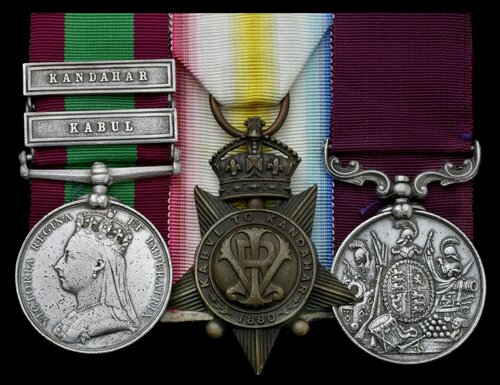
Auction: 21001 - Orders, Decorations and Medals (conducted behind closed doors)
Lot: 437
(x) Three: Sergeant-Major H. F. Murrant, 9th Lancers, who charged with his troop at Killa Kazi and marched with General Roberts from Kabul to Kandahar
Afghanistan 1878-80, 2 clasps, Kandahar, Kabul (1358 Sergt. H. Murrant; 9th Lancers.); Kabul to Kandahar Star 1880 (1358 Sergt H. Murrant 9th Lancers); Army L.S. & G.C., V.R. (1358 Tp Sjt Maj: Sjt. Maj H. Murrant. 9th Lancers), pitting and bruising, nearly very fine (3)
Henry F. Murrant enlisted with the 9th (The Queens Royal) Lancers on 22 May 1871 in Aldershot and was given the regimental number 1358. At the time of the Second Afghan War he was a Sergeant serving with 'D' Troop. His unit was certainly present at the fighting around Killa Kazi on 11 December 1879 when a small force of British cavalry charged the Afghan army in a doomed effort to save their guns from capture:
"I had not gone fifty yards when I came across a wounded man - Private Cavanagh (…) No.1334 Private J. Cavanagh, D Troop, 9th Queen's Lancers"
(The Life of Trumpeter, C. E. Duly, refers)
After this engagement the British Army withdrew into the Sherpur cantonment and weathered an extended siege. The arrival of General Gough's brigade precipitated the start of the Battle of Kabul on 23 December 1879. The Afghan army struck at the cantonment and was driven off by heavy fire. At this point General Roberts counter-attacked and the cavalry, including the 9th Lancers, were unleashed upon the wavering enemy. By the morning of the 24 December the Afghan army had dispersed.
Following a surprise turnaround at the Battle of Maiwand, General Burrows' army was forced to withdraw to Kandahar where Mohammad Ayoub Khan's troops placed them under siege. General Roberts' Army, including the 9th Lancers, were still at Kabul and upon hearing of the disaster they prepared for a forced march of around 320 miles. This astonishing feat was pulled off in only 20 days through high temperatures and over difficult roads. The relief army reached Kandahar on 31 August 1880 and prepared at once to take the fight to the besieging army. A reconnisance in force on 31 August provided the information that the Afghans had fallen back on the village of Mazra behind a range of hills. Roberts elected to attack this excellent defensive position the next morning, 1 September, and prepared his army accordingly.
The plan was for three columns to strike at the defences around Gundimullah Sahibdad, Gundigan and Pir Paimal with the cavalry manoeuvring behind the enemy line to cut their retreat. In practice while the infantry succeeded in carrying the hills and breaking the Afghan army the cavalry was unable to close the trap due to confused orders and poor terrain. Nevertheless the victory cost Ayoub Khan his support and enabled the British to withdraw from Afghanistan the following year.
Murrant remained with the 9th Lancers, reaching the rank of Troop Sergeant Major by 1889. He was discharged on 22 August 1896 and died only a few months later in Fareham at the age of 43; sold together with copied research including army pay lists, regimental medal rolls and census information.
Subject to 5% tax on Hammer Price in addition to 20% VAT on Buyer’s Premium. For more information please view Terms and Conditions for Buyers.
Sold for
£1,700
Starting price
£480




